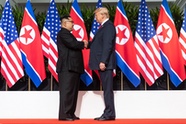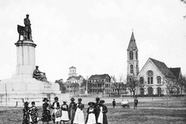Roundup Top 10!

We Don't Have to Imagine the Consequences of Abortion Bans. We Just Have to Look to the Pastby Leslie J. ReaganMaking abortion illegal never meant abortion didn’t happen. For the entire century of criminalized abortion, women of every class, marital status, religion and race still obtained them. |

Why nuclear diplomacy needs more womenby Elena SourisHistorically, a homogenous group of policymakers make innovation less likely. |

Rashida Tlaib’s critics have Palestinian history all wrongby Maha NassarThe decades-long process that led to the creation of Israel involved plenty of Palestinian suffering. |

The Real Reason Iran’s Hardliners Don’t Want To Talk To Americaby Shireen T. HunterTehran’s reluctance to engage in direct talks with America at a normal state-to-state level within a bilateral framework long predates the Trump administration. |

Calhoun statue should not stand in prominent public spaceby Joseph A. DarbyThe only good “compromise” is to take it down and involve those who cherish his memory in choosing a suitable venue for its more appropriate display. |

We need to stop focusing on the mental health of mass shootersby Deborah DoroshowMentally ill Americans are already stigmatized — and wrongly so. |

Living in a Nation of Political Narcissistsby Tom EngelhardtAmerican election exceptionalism from 1945-2019. |

How Democrats can win the abortion war: Talk about Roe's restrictions as well as rightsby Jonathan ZimmermanRepublicans are lying when they paint us as the party of death and infanticide. Fight back by championing both the right to abortion and limits on it. |

On the Recent Executive Order on"Free Inquiry" in Higher Educationby James Grossman and Edward LiebowPresident Donald Trump’s executive order of March 21 on “free inquiry, transparency, and accountability in colleges and universities” is a textbook example of a classic negotiating ploy—misdirection. |
</

Reclaiming History From Howard Zinnby Naomi Schaefer RileyThe left’s portrait of America’s past has triumphed thanks to the abdication of serious historians. Wilfred M. McClay offers an antidote. |